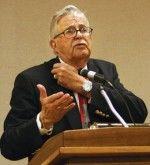Paul J. Murphy was floating in the water under the blistering hot sun after a Japanese submarine torpedoed his ship, the USS Indianapolis, on July 30,1945. For four days and five nights Murphy and hundreds of other men prayed and hoped for their rescue.
“A lot of us learned a lot of faith out there in the water,” said Murphy Tuesday in Memorial Student Center 224. “There are many of us who don’t believe we would have lasted another 24 hours.
He said he and the rest of his fellow crew members were discovered on the fourth day when a pilot spotted an oil slick in the water and radioed his base at Peleliu, an island in the Pacific Ocean.
Murphy said the men did not realize how poor their condition was at the time, but rescue workers told them later.
“Some of the things (the rescuers) told us were almost unbelievable,” Murphy said. “As they started to pull men out of the water, they’d grab them by the arms and their skin would come right off.”
The (crew members’) clothes and hair were completely black with tar so rescuers could not tell if the men were black or white.
Murphy said the rescuers acted as nurses when they brought the survivors to their ship.
“They washed us down with kerosene and afterwards washed us down with soap and water,” Murphy said. “They gave us their skivvies, underwear, and took us to their bunks.”
According to ussindianopolis.org, the sinking of the USS Indianapolis was the worst naval disaster in U.S. history with 317 of the 1,196 men on board surviving. The U.S.S. Indianapolis was torpedoed just four days after dropping off the atomic bomb on the Tinian island.
Shayna Spurlin, a senior English major who invited Murphy, said the survivors want their story to live on.
“There are about 98 of them left, and they are getting older,” Spurlin said. “Their speeches just help our generation and generations younger than ours take away something from history and keep that (history) alive … and it helps to make sure that the men who died on the Indianapolis didn’t die in vain.”
Carolyn Meyer, a sophomore political science major, said everybody should hear stories that survivors can tell while the opportunity is here.
“I always wish I knew what my grandfather did in World War II,” Meyer said. “He died before I was born, so I never got a chance to ask him.”
Meyer, who will be following in the footsteps of her grandfather and father by joining the service, said hearing Murphy’s story makes her want to live up to them.
“It just makes me aspire to be more like them,” Meyer said, ” (and) try and do something with my life that is memorable.”
USS Indianapolis survivor shares story
November 17, 2004

0
Donate to The Battalion
$1815
$5000
Contributed
Our Goal
Your donation will support the student journalists of Texas A&M University - College Station. Your contribution will allow us to purchase equipment and cover our annual website hosting costs, in addition to paying freelance staffers for their work, travel costs for coverage and more!
More to Discover









